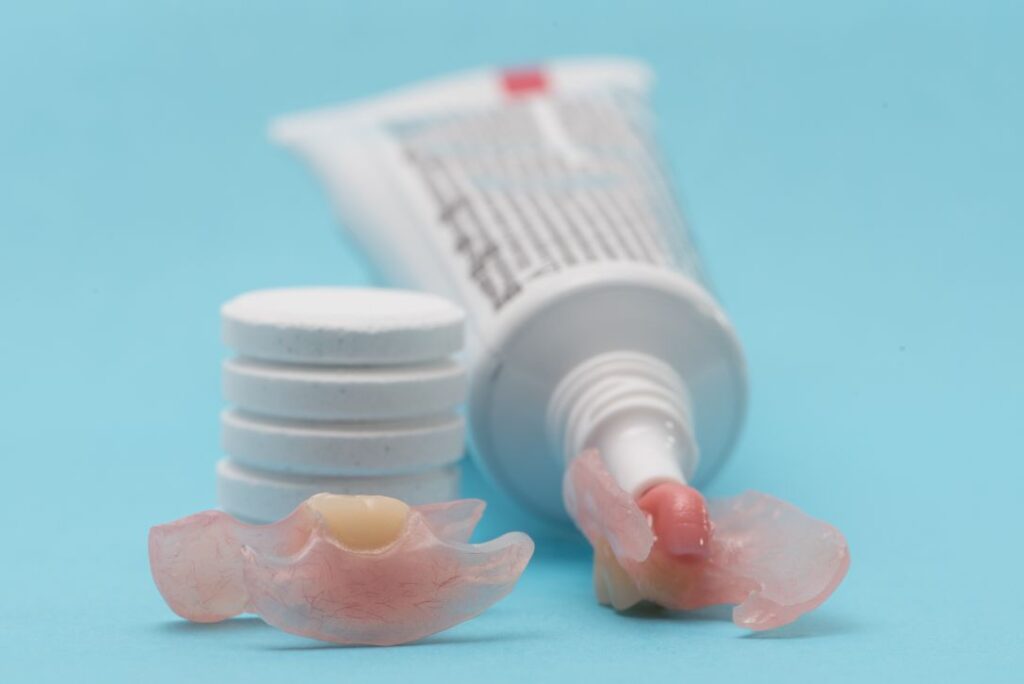
Whether you have brand new dentures or need a little extra help securing an older pair, denture adhesives can be a great tool. These products are a temporary way to hold your prosthetics in place, so you needn’t worry about them slipping while you are speaking or eating. But how do you know which type of adhesive is best? Here are a few different types, their benefits, and how to use them.
Which Denture Adhesive is Right for Me?
When it comes to choosing a denture adhesive, the type you select is a matter of personal preference. Each product ranges in price and formula, but all do a good job temporarily holding dentures in place. They are great for securing new dentures as they adjust shape to better fit your arches, however, if you find that you need to rely on adhesives for older dentures, this is a good sign that it may be time for a reline or replacement.
It is important to note that the American College of Prosthodontists (ACP) recommends avoiding denture adhesives that contain the mineral zinc, as excessive use has been found to cause adverse reactions such as numbness, tingling, and nerve damage.
Denture Adhesive Cream
Denture cream is one of the easiest types of adhesives to use, however it can be messy if you aren’t careful. Therefore, be sure to apply sparingly so as not to cause the excess from oozing out from the edges of your prosthetic. To apply it, follow these instructions:
- Clean dentures thoroughly and dry them completely.
- Squeeze the adhesive directly onto the denture in short strips, careful not to get any on the edges.
- Rinse out your mouth with water.
- Put the denture in your mouth, pressing it into place as you hold it firmly for a few seconds. Then, bite down on it to secure it.
Denture Adhesive Powder
Dernture adhesive powder is a little easier to use in that you can direct where the spray goes with greater control than you can with pastes. The downside to powders is that they can leave residue on your countertops and sink, so be prepared to clean it up any excess after your dentures are in place. To use, follow these steps:
- Clean your dentures thoroughly and leave them wet.
- Spray the adhesive powder very lightly and evenly on only the surfaces of the denture that contact your gums and roof of your mouth.
- Rinse out your mouth with water.
- Shake off the loose powder from your denture.
- Put your denture in your mouth and press down on it to set it in place.
Denture Adhesive Strips
Denture adhesive strips are the tidiest way to secure dentures, since they have no residue and cannot ooze out over the edges of your prosthetic. They do require a bit more dexterity to properly place, so if you struggle with this, you may want to use powder or paste instead. To use, follow the steps below:
- Thoroughly clean and dry your dentures.
- With clean, dry hands, take the adhesive strips out of their packaging.
- Using water, moisten each strip, one at a time.
- Following the instructions on the adhesive packaging, attach each strip to your dentures, keeping the strips away from the edges. Do not overlap them. If you need to adjust the size, they can be torn or cut into shape as needed.
- Rinse your mouth with water.
- Press your denture into place, holding onto it firmly. Bite down on it to obtain a firm hold.
Cleaning Adhesive Off Your Dentures
When you’re done wearing your dentures for the evening, it’s important to clean off any adhesive you used during the day. To remove your prosthetics, swish around some warm water in your mouth and then gently pull them out. Put them down somewhere safe, such as on a towel or in a sink full of water. Using a soft-bristled toothbrush, scrub off the remaining adhesive from your gums using regular toothpaste.
To clean your dentures, get a second toothbrush and scrub the entire prosthetic with either mild hand soap or a denture cleanser. Be sure to floss between every tooth, and rinse well. Gently deposit your dentures in a glass of water or soak until you are ready to wear them again.
Remember, unless your dentures are new, you should not need to use adhesive to keep them in place. Should they begin slipping or if you feel as though they no longer fit like they used to, schedule an appointment with your dentist at your earliest convenience, as this could indicate that they need a reline or it’s time for a new pair.
About Our Practice
At Amaze Dental, Dr. Najjar and Dr. Le want to help you restore your gorgeous grin. Whether you need a bridge, dental implants, or a new set of dentures, we’re proud to offer a variety of solutions to help restore the form and function of your smile. If you are interested in learning more about dentures, or if you need assistance in repairing your current dentures, please schedule an appointment with us today by visiting our website or calling us as 972-230-1100.
